I have led an interesting life. In just 30 short years, I have experienced some of the highest of highs and some of the lowest of lows. I have witnessed things happen that one should not witness until grey hairs appear, and yet at the same time I am considered young to most.
Recently, I have gotten to speak of these experiences to a variety of students. From the women who enroll in my Equine Reproduction class at Midway University, to the kids who enrolled the agricultural department of the Greene County Career Center, my range of audience has been wide.
Most recently, I was invited to talk to the Equine Scholars at Georgetown College, and was asked to explain “my life.” What got me to this location? What made me choose a career in horses? How did this passion for riding and managing horses lead me to a doctorate in veterinary sciences? And more importantly, how did I get to experience these things in such a short time line?
Because my resume is not normal. My last name reading Fedorka does not ring a bell in any inner circle of the thoroughbred breeding and racing world. I didn’t experience my first horse race until the age of 22, and I didn’t see a mare deliver a foal until I was 23. Only 7 years ago.
But my story is one that most of these younger generation can relate to, one that motivates them. Because my name and my connections got me nowhere. Instead, a lot of hard work, intelligence, dedication, mixed together with a bit of desperation did. I have blogged of many of these experiences – from working as a wrangler at a ranch in Wyoming, to being hired at my first breeding operation moreso due to my ability to construct a website than my ability to lead a yearling.
But I made it work. And I grew both as a person and as a horsemen. And I fell in love with this industry of breeding, selling, racing, and retraining thoroughbreds. In less than a decade, they convinced me to go from outsider and wary observer to insider and champion.
So with that, I am now being asked to speak to this next generation of how to get to that foot in. And then more importantly, how to dig deep with that foothold and continue to climb the ladder.
These are my guidelines; my rules for success in this industry:
Don’t consider yourself above any job. Ever. I truly believe that this was how I moved up so quickly, and how I got to experience so much. Drive the truck and trailer? Sure. Wash foal butts? Yup. Go muck out and power wash the isolation barn? Ok. Do it all, and with a smile on your face and some country music blasting.
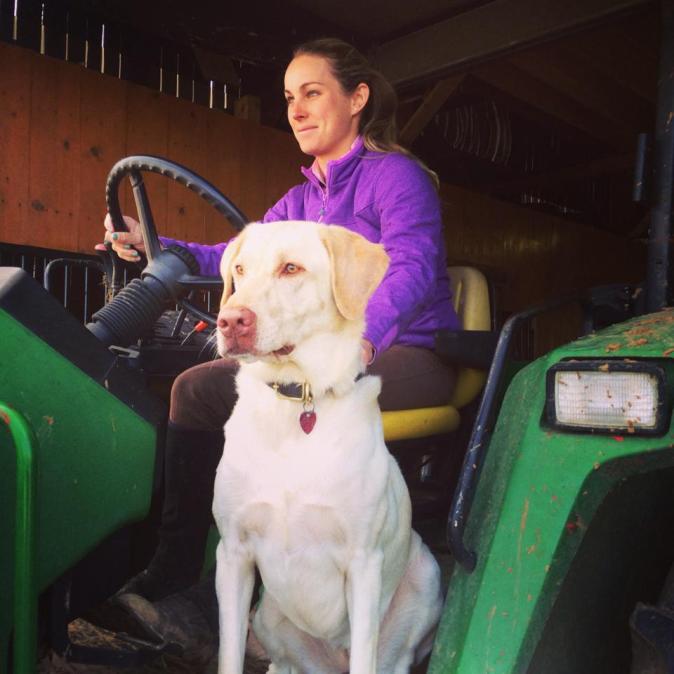
This was the first thing I learned on Chesapeake Farm when I was hired. I couldn’t tell you the difference between a Storm Cat and an A.P. Indy, and I sure as heck didn’t know how to put on a sweat. I had never heard of animalintex, and had never handled a hickory twitch. But what could I do? Show up every day on time with a smile and say yes. Come an hour early to meet the vet? Of course. Stay late to meet the shipper? Why not! I was a yes woman, a skill that every young person should learn to be.
2. Admit any insecurity – and then learn how to change that to a security. If you don’t feel comfortable handling stallions-that’s fine. I would rather you and the stallion stay safe versus having a bruised staff member, a lacerated stallion, and 2 mares that now need lutalyse. A good manager can teach much more rapidly than they can undo.
I call this my “Jackie” story. I interviewed a young University of Kentucky undergrad one spring as a potential candidate for an internship. She would be working under me as I completed my masters research project on the farm. And while I needed someone competent around horses, moreso I needed someone who was able to help me at a moments notice. Jackie Barr showed up and immediately admitted that she had zero experience with mares and foals, had never seen a rectal ultrasound performed, and couldn’t tell you the difference between oxytocin and hCG. But, she adamantly proclaimed with a smile that she was always on time and wanted to learn.
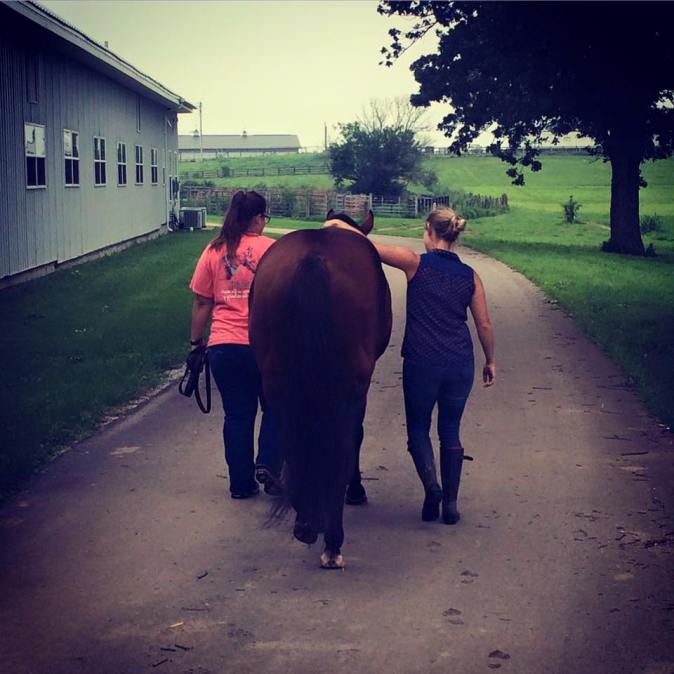
Jackie handling her favorite stallion, Zippy
And learn she did. Within weeks, she was fully competent on the mare side of the research, and by the end of the summer she was handling and collecting stallions. Jackie admitted all of her insecurities, but then made her want to learn apparent. By the end of the summer, we had offered her a paid position throughout the school year, one which lasted two years. Jackie because the right hand woman for every graduate student in our lab, and in exchange, we offered an education second to none. And at the end of her college education, it was our lab and its faculty that wrote glowing references for Jackie’s future – where she works at one of the premier warmblood breeding farms.
Be tough. Don’t cry. Ever. And I mean that. So many women have paved the way for you to convince the farms and their staff that we are just as tough as the men. And I don’t mean you won’t be upset, or that you won’t cry at home, but compose yourself when you’re on the farm. Always.
There were so many days where I felt frustrated, overwhelmed, exhausted, or had my feelings hurt. There were moments where I had to stand my ground and combat unhappy employees or fellow managers. I lost horses I loved, and was battled by horses I didn’t. And there were certainly situations where things didn’t go to plan and I felt the weight of the world on my shoulders. But I stuck to the motto that there is no crying in horses – at least not in public.
So walk quietly out to that farm truck, drive to the hay barn, and let it loose. But you will wipe those tears away, slap some cold water on your face, and get back to the job the minute those tears dry up.
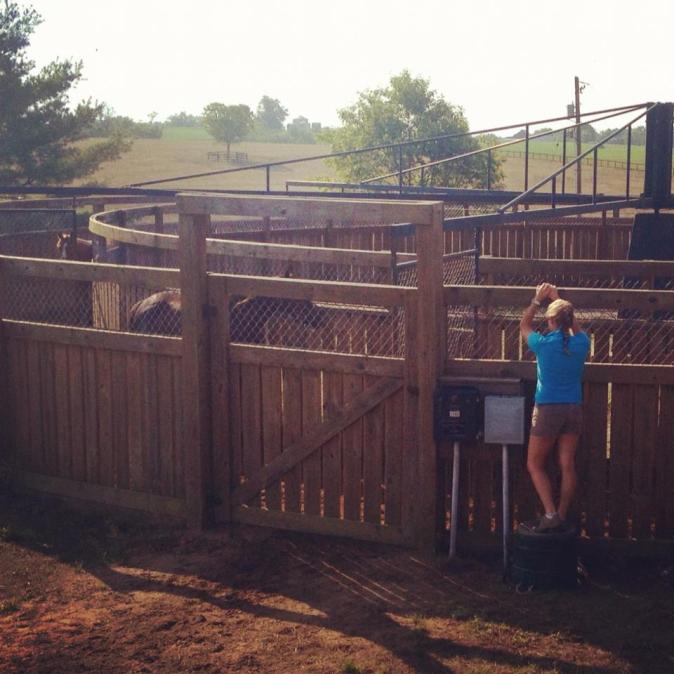
Taking a moment to myself while still focusing on the job at hand
Be a team player. These guys that you are working alongside have probably been on that farm for 5-10 years, if not more. And just because they speak with an accent, or don’t speak English at all, doesn’t mean that they are automatically beneath you. These guys can be your best friend or your worst enemy. But when you are considered an insider, you will receive the most support and the best source of knowledge and information.
I was blessed by one of the best staffs in the business when I started at Chesapeake. At first they were hesitant – who is this little blonde thing who doesn’t speak a lick of Spanish? The one who gets to go inside the office in the afternoons instead of mucking out the rest of the barns? The one who gets to ride with the manager when we go on vet rounds? And yet they quickly grew more welcoming and less standoffish with every day that I picked up that pitchfork and mucked alongside them or offered to take the muck to the field when it rained.
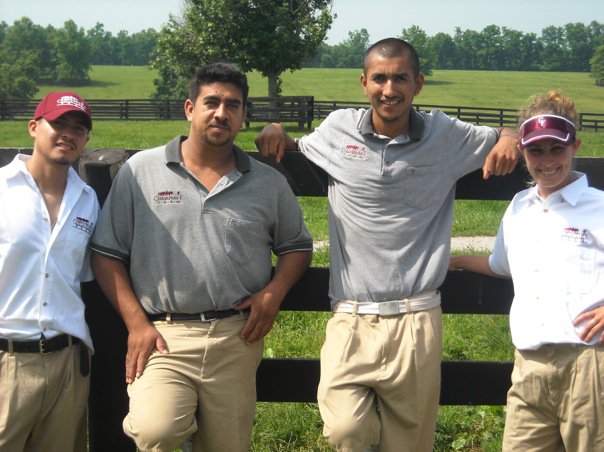
Being a team player, even if it meant wearing these god awful man shorts.
And those men who I didn’t know, nonetheless understand, became my family. They were the first to hand me a warm sandwich on a cold day, or a hug when I found out my grandmother had passed. They welcomed me to their families celebrations and handed me a beer at the end of a long day. And truly, they became the first friends I made in Lexington; friendships I still hold dear.
Be professional. This might be a farm job, and you might simply be in charge of mucking 60 stalls a day, but that doesn’t mean you are any less than the CFO of a company. So be on time. Dress for the job you want, not the job you have. Be cordial. Make connections with everyone around you. And realize that everyone is watching, at all times. You don’t know who that person is who you just made wait for 20 min to see a yearling. So always be polite. Always.
This goes for all aspects of life – from the farm, to the breeding shed, to the sales, and even the local pub. Some of the best connections I made in this industry were by sharing a pint at the local Irish bar. I have been offered jobs by people at the sales who I didn’t even realize were watching me. And I have met people who share that they had read my most recent blog and I had no idea that they even knew my blog existed.
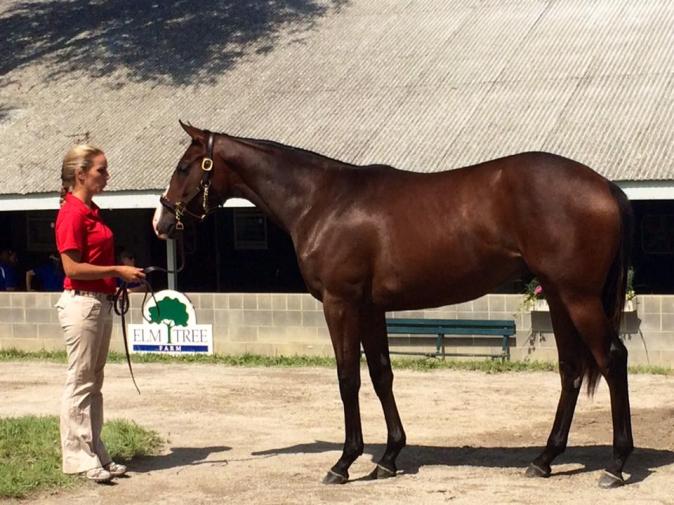
Someone is watching you. At all times. So hold your chin up, keep your hands soft, and be the first one to the rake or the hose.
You are your own business card. And they might not know your name – first or last – but they will soon recognize your face. So hold that face up. Say yes. Be professional. Be humble. And still be confident.
And perhaps most importantly – the most important rule of them all – is to be in this for the horses. Because they will never know if your last name is one of fame and fortune. And they will never know if you can’t spell Eskendereya. But they will forever be impacted by your hands, your mind, and your presence.
Fabulous article and true for all walks of life!
You hit it head on! You are wise beyond your years!
Excellent!!
Yup. Spot on
You did it again Carleigh. Great job. Proud to ” know ” you.
Absolutely fantastic article! Really loved reading it! Thank you for the tips/guidelines. I look forward to reading more of your work.
Blessings!
– Cat
Excellent Article !!!
Excellent, you are me, 40 years ago! I would not trade my life or experiences for anything.
Thanks so much for the kick in the butt as I struggle. Broke, frustrated, wondering if I’m even good enough to pursue this, this was a wonderful incentive to keep on ticking.
This post helps me so much! I started at UK under the Equine Science program and I was a total outsider. Everyone in my class came from “horse farm” families, had horses of their own, worked at various farms, etc. I was taught how to ride when I was four and hadn’t rode a horse in eight years by time I started at UK. I knew nothing, except how to groom and muck stalls. I simply just loved horses, I always had, they’re therapeutic to people like me who struggle with anxiety disorders. You took the route that I tried to take but wasn’t strong enough to at the time, and that’s so inspiring to me! To know that it is possible for an outsider or someone without connections can make it. I felt so isolated that my anxiety issues got the best of me and I ended up dropping out. Although I am now looking towards a degree in Cognitive Psychology, but my love of horses will remain a fiery passion and hopefully can one day become a frequent hobby. Thank you for this post!
Many, many, many people come from non-horse families/backgrounds. It’s a love that starts with each individual. I’m a top rider, breeder & overall horse lover who started on my own because no one told me I couldn’t. I figured my children would follow my love…not one of them did although both their parents were top contenders.
If you (or anyone) has a desire to pursue an art or interest, JUST DO IT!! Don’t ever make excuses as to why you can’t or why it won’t work or for you.
I’m new to your blog, and followed the link of a friend on FB. I will be sharing your extremely well written article. Your message is the message I carry to this day for younger veterinarians of either gender. I am a male vet who had many of the same experiences as you back in 2002. Thank you for sharing, and kudos on the well constructed blog post.
“You are your own business card.” So true- in any industry!
I can’t even describe how much I love this! As someone who worked hard from the ground up starting with unpaid breeding interships I can TRULY understand each of the things you have said 110%. You have put into words all of our thoughts over the years, especially what you said about the staff. I was also once a blonde girl that didn’t speak a lick of Spanish :). Thank you for speaking our lives and struggles into words! While I am not that much further than I was a few years ago after those first internships, I learn more every day and have enjoyed every step of the journey. That’s what it’s all about :).